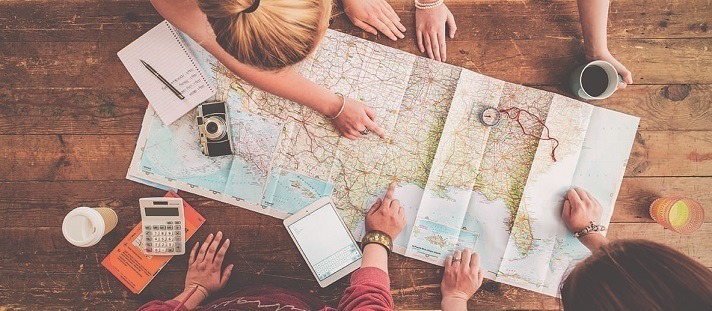Q&A with researcher Robb Rutledge on mental health, expectations, decision-making and, yes, holiday planning!
 Have you ever looked forward to a concert, beach vacation, or party only to find yourself not enjoying it as much as you thought you would?
Have you ever looked forward to a concert, beach vacation, or party only to find yourself not enjoying it as much as you thought you would?
You may be suffering from overly high expectations, says psychologist Robb Rutledge of Yale University. Rutledge and his colleagues have been using smartphone-based data collection (via a free app called Happiness Quest, where anyone can play short games and contribute to research) to see how our expectations affect our future happiness. Some of their findings point to novel approaches for increasing our enjoyment of everyday life.
We talked with Rutledge about his research results and what they mean for us for cultivating happiness.
Jill Suttie: How do our expectations affect our happiness?
 Robb Rutledge: There are lots of small, risky decisions we make in our everyday lives that affect our happiness. For example, when you decide to go to a restaurant, and you order something, you’ll have expectations about how good it will be. But you’re taking a risk there: Your meal could be better than you expected, or it could be worse than you expected.
Robb Rutledge: There are lots of small, risky decisions we make in our everyday lives that affect our happiness. For example, when you decide to go to a restaurant, and you order something, you’ll have expectations about how good it will be. But you’re taking a risk there: Your meal could be better than you expected, or it could be worse than you expected.
We’ve found in our research that expectations are really important for happiness. If you expect the meal to be great, and it’s actually good, that’s fine. But, if it’s not any better than you expected, your happiness won’t increase any more after having the meal. It’s only when the meal exceeds your expectations that the experience will increase your happiness.
JS: Does that mean we shouldn’t anticipate future events if we want to be happy?
RR: I don’t think so. If you make a plan to meet a friend at a new restaurant, and you’re looking forward to it, your happiness might be elevated for the whole day (until you actually go to the restaurant). But, if the meal is exactly as expected, you will be happy because you were happier going into the restaurant, not because of the meal. Your happiness won’t increase any more if everything goes exactly like you thought it would go.
In general, we want to have realistic expectations, because accurate expectations are useful for making good choices. Plus, without them, it’s hard to learn from experience. Your brain is always on the lookout for surprises—you don’t change your beliefs when everything goes as expected. If you go to a new restaurant that you’ve never been to before, and it’s actually really good, your brain needs to be updating your beliefs and increasing how much you value that restaurant. You’ll be more likely to go to it in the future, because it was actually better than you expected.
Especially for anything that you’re going to do many times—like choosing a place to go for lunch near your office or choosing which coffee shop to go to meet a friend—you want to have accurate expectations or you won’t make good choices.
JS: What about something like a vacation, which you might only do once in a lifetime?
RR: That partly depends on whether we’re talking about your happiness or your family’s happiness. If you are planning a vacation with family, you need to make good decisions—like how you’re going to plan out your schedule, how long the train ride is going to take, what activity you’re going to do on a certain day. You’re probably going to have realistic expectations, because you’re making those decisions based on reviews or a guidebook or other information.
For your family members, who are coming along but not involved in planning, it’s a little bit different. It’s probably fine if you give them some of the highlights and don’t talk to them about how long the train ride is going to be. Their expectations might actually be a little bit too high—they’ve seen some beautiful pictures and they’re looking forward to sitting on a beach. But, on the plus side, they get to be excited and look forward to the holiday over the next month. That’s mostly harmless.
The danger with that, though, is that you go on the vacation…and it rains. That wasn’t something they were imagining; so, the beach is not as fun as they expected it to be, and they could be disappointed. If you are almost about to leave on a trip and you can tell that someone’s expectations are a little too high, because you know about the long train ride or you actually looked at the weather forecast and saw rain in it, you might want to let them know about those things at the last minute and reduce their expectations to something that’s more realistic. That will decrease the odds that they end up disappointed.
JS: Given that many vacations don’t live up to the hype (especially this year, with COVID-19 disrupting travel), what do you recommend people do to increase their chances of being happier afterward?
RR: People often have the idea that they should squeeze things in, like touring Europe in a week and going to a different city every day. While it’s true that you can do that—you can certainly see a lot of amazing things in a short amount of time, hopping from city to city—you’re also less likely to be surprised in a positive way. You may go to the same museum that everyone goes to, and it may be better than you expected. But there’s also a good chance that it’s just exactly what you expected, because you’ve seen a lot of pictures, and it’s not actually going to increase your happiness further.
Especially if a little uncertainty doesn’t bother you, there are more chances for positive surprises if you don’t plan every little thing. If you’re trying to come home from your holiday happier, it will be more likely to happen if you experience some things that exceed your expectations. And you’re just more likely to have a really great, memorable experience that exceeds your expectations if you have a little extra wiggle room.
Recent events have a bigger impact on happiness than earlier events, so it can be a good strategy to save a couple things that have a chance of a big positive surprise for the last few days of your trip. It could be a novel experience that a lot of people like but you’re not sure what to expect (like the kind of things on the Atlas Obscura website). It probably isn’t another museum. Just make sure it’s not something that could get rained out.
JS: Do you think outside influences tend to push us toward having too high expectations for future experiences?
RR: If you’re asking about social media…well, most people carefully choose which vacation photos to put on Facebook or Instagram. If they went on a really long train ride that was kind of unpleasant, they’re not going to put a photo of that on social media. So, I think that could lead to unrealistic expectations about what a holiday was like. When you go on that same trip, you’ll have to deal with the train ride or the rain or those sorts of things.
On the other hand, you can still enjoy yourself. The great beach days are still going to be there—there’s just a lot of other stuff that you will probably also edit out (and mostly forget unless it was truly terrible) when you post your own travel photos.
JS: Can our expectations be too low?
RR: Yes. If you have low expectations all of the time, you may not be motivated to try new things or take risks, because you don’t expect things to go well. That means you won’t actually go to the new restaurant or experience new situations. That’s not ideal. It’s hard to grow as a person if you avoid any uncertain situation.
Unless you have someone in your life (like a friend or roommate) that drags you along when they are going to a social event, you may be missing out on a lot if you have low expectations of everything. Your default decision may be to not do anything, and that’s not a recipe for happiness for most people.
JS: Obviously, disappointment does not lead to happiness. Is there something we should do to manage disappointments better when they arise?
RR: That’s a tricky situation. When you’re disappointed, it doesn’t feel great at the time. But it means something. It helps tell you what you value or care about, and that’s actually useful information for yourself.
In our research, we’ve found that how happiness changes from minute to minute can be predicted with our mathematical equations. But those equations aren’t the same for everyone. Two people could be in the same situation and one of them is much more disappointed. If you’re disappointed because your expectations were really unrealistic, you can ask yourself in the moment, “What was I expecting to happen?” Maybe, after thinking about it a little, you realize you were expecting too much. Then, you can revise your expectations a little bit.
It may be too late, in a sense, because you already feel bad. But I don’t think that’s the end of the world, as long as you don’t dwell on it and stay upset for days. You can listen to yourself and use the information to make better decisions in the future. That’s ultimately bound to point you toward a happier life.
 — Jill Suttie, Psy.D., serves as a staff writer and contributing editor for Greater Good. Based at UC-Berkeley, Greater Good highlights ground breaking scientific research into the roots of compassion and altruism. Copyright Greater Good.
— Jill Suttie, Psy.D., serves as a staff writer and contributing editor for Greater Good. Based at UC-Berkeley, Greater Good highlights ground breaking scientific research into the roots of compassion and altruism. Copyright Greater Good.


